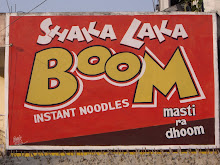In the last couple of weeks i’ve done two important things. I shut up and just travelled.
Yokohama is less than an hour west of Tokyo by train and as a result there isn’t an obvious boundary between the two. The buildings just get smaller and then bigger again as you leave one megacity and enter a smaller one. Tokyo does that. It merges and blurs all the boundaries around it so you can never really tell just how big it is. Yokohama is probably most famous for its China Town which should be more accurately named Chinese Restaurant Town. Most of the China Towns that i’ve been to in major cities just seems to a be a load of Chinese restaurants and a couple of oriental supermarkets crammed into a few small streets with an old gnarly gateway hemming in busloads of tourists and Yokohama fits that idea very well. Still, it was a great place to get lost in, it smelt and sounded exactly like China and the food was oily and tasty.
Yokohama has a history of foreigners coming and going and the China Town plays its part in that along with a huge foreigner’s cemetery shrouded in green and trees which overlooks the city centre. Just next to the cemetery is a suburb called Motomachi that wouldn’t look out of place somewhere in Europe with chic storefronts and bakeries serving expats and Japanese with equal measure on small pedestrian streets. There’s an obvious mix of past and present, Japanese and foreign in Yokohama. Some of the grand old buildings look like they’ve been lifted out of Europe in the 1920s and dropped into Japan in the functional 1980s and then been made to sit all day next to glass fronted modern equivalents.
I also went to an onsen (hot spring) two hours north of Tokyo last weekend in a place called Kinugawa. It was a small town hemmed in by mountains and cut in two by a river. The town is famous for the volcanic water that flows up and into the onsens that have grown into hotels that now line the river and give the town its well known name. My friend booked a night in one of the hotels which was an interesting place. It was like being in a Japan in 1975. Everything seemed faded with time and creaked with age. Things looked well worn but also look as if they hadn’t been used in years and it echoed of time that was much busier. But it was still pulling in small crowds of people – most of them, like the building itself, seemed faded with time and creaked with age. Actually, it was like being in an old people’s home in Japan in 1975. The Japanese onsen is a communal experience so i shared a few relaxing hours immersed in piping hot mineral rich water with a load of naked elderly Japanese men which was much more relaxing than i’ve just made it sound. The price of the hotel also included a huge traditional dinner, a fridge full of beer and other assorted alcoholic drinks and a breakfast. So, it was like a large all you can eat and drink restaurant in a Japanese old people’s home in 1975. With a volcanic bath. Breakfast was a bit disconcerting as i looked across what was once a ball room at the buffet breakfast and saw an elderly man try to fit some more cooked fish in a bowl and thought to myself, “I’ve seen him naked.” Which is not thought I often want at breakfast. Or at any other meal time really. Onsens are funny places.
Life rolls on in Myoden but hopefully i’ll see some more random crap soon. Thanks for reading.
Friday, February 25, 2011
Subscribe to:
Post Comments (Atom)

No comments:
Post a Comment